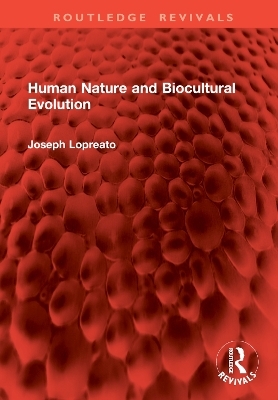
Human Nature and Biocultural Evolution
Seiten
2024
Routledge (Verlag)
978-1-032-96093-7 (ISBN)
Routledge (Verlag)
978-1-032-96093-7 (ISBN)
First published in 1984, Human Nature and Biocultural Evolution aims to delineate a theory of human nature, viewed as an interrelated set of genetically programmed behavioral predispositions, and a theory of biocultural evolution. This book will be of interest to students and researchers of sociology and sociobiology.
First published in 1984, Human Nature and Biocultural Evolution aims to delineate a theory of human nature, viewed as an interrelated set of genetically programmed behavioral predispositions, and a theory of biocultural evolution. The author’s approach is based on the hypothesis that innate predispositions and cultural-environmental factors cooperate to determine human behavior and socio-cultural forms.
Professor Lopreato begins by tracing the development of evolutionary biology up to sociobiology. It is his argument that the social and biological disciplines have, for over a century, been moving towards a synthesis, and that Homo sapiens is neither just another animal, nor so unique a being that culture has become divorced from its genetic underpinnings. The argument is supported with evidence from evolutionary biology and social science, with a critical discussion of basic issues of behavioral science and with an analysis of certain famous theories in social science (e.g. theories of suicide, anomie, capitalism), which prove to be richer and more complete when viewed from a biocultural perspective.
The theory of human nature is arrived at through a rich analysis of ethnographic, psychological, and sociological arguments and data, as well as facts and theories from comparative zoology. In the process, the author treats critically numerous theoretical problems associated with topics such as exploitation, class consciousness, structured inequality, reciprocal behavior, territorial aggression, religious ritual, socialization, ethnicity, and prejudice. The author concludes with an examination of behavioral predispositions that are hypothesized to be at the base of cultural variation.
First published in 1984, Human Nature and Biocultural Evolution aims to delineate a theory of human nature, viewed as an interrelated set of genetically programmed behavioral predispositions, and a theory of biocultural evolution. The author’s approach is based on the hypothesis that innate predispositions and cultural-environmental factors cooperate to determine human behavior and socio-cultural forms.
Professor Lopreato begins by tracing the development of evolutionary biology up to sociobiology. It is his argument that the social and biological disciplines have, for over a century, been moving towards a synthesis, and that Homo sapiens is neither just another animal, nor so unique a being that culture has become divorced from its genetic underpinnings. The argument is supported with evidence from evolutionary biology and social science, with a critical discussion of basic issues of behavioral science and with an analysis of certain famous theories in social science (e.g. theories of suicide, anomie, capitalism), which prove to be richer and more complete when viewed from a biocultural perspective.
The theory of human nature is arrived at through a rich analysis of ethnographic, psychological, and sociological arguments and data, as well as facts and theories from comparative zoology. In the process, the author treats critically numerous theoretical problems associated with topics such as exploitation, class consciousness, structured inequality, reciprocal behavior, territorial aggression, religious ritual, socialization, ethnicity, and prejudice. The author concludes with an examination of behavioral predispositions that are hypothesized to be at the base of cultural variation.
Joseph Lopreato was former chairperson of the Department of Sociology, University of Texas at Austin, USA. He published widely in areas such as sociological theory, political sociology, social development, and ethnic studies.
1. Introduction 2. Behavioral Predispositions, Cultural Universals, and Cultural Variants 3. The Interplay of Biology and Culture 4. Predispositions of Self-Enhancement 5. Predispositions of Sociality, I 6. Sociality, II: Ascetic Altruism 7. A Model of Sociocultural Variation and Selective Retention 8. Behavioral Predispositions and Religious Behavior 9. Evolutionary Foundations of Family and Ethnicity
| Erscheint lt. Verlag | 2.12.2024 |
|---|---|
| Reihe/Serie | Routledge Revivals |
| Verlagsort | London |
| Sprache | englisch |
| Maße | 174 x 246 mm |
| Themenwelt | Geisteswissenschaften ► Psychologie ► Sozialpsychologie |
| Studium ► 1. Studienabschnitt (Vorklinik) ► Med. Psychologie / Soziologie | |
| Sozialwissenschaften ► Soziologie ► Allgemeines / Lexika | |
| ISBN-10 | 1-032-96093-0 / 1032960930 |
| ISBN-13 | 978-1-032-96093-7 / 9781032960937 |
| Zustand | Neuware |
| Informationen gemäß Produktsicherheitsverordnung (GPSR) | |
| Haben Sie eine Frage zum Produkt? |
Mehr entdecken
aus dem Bereich
aus dem Bereich


